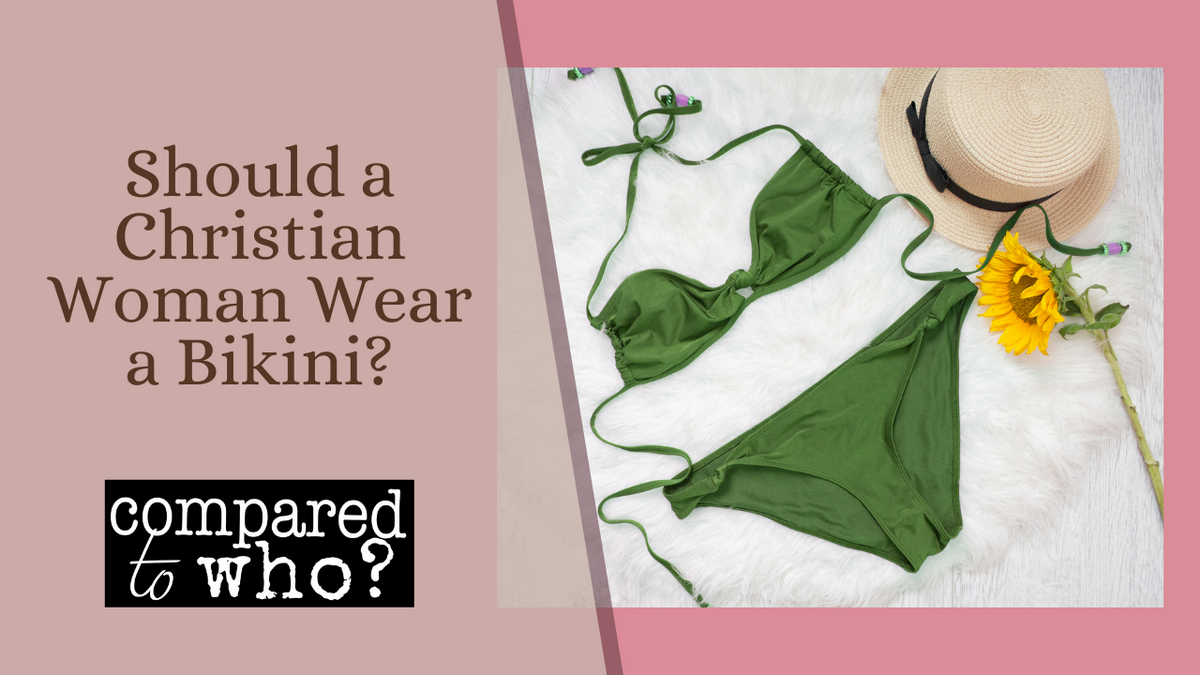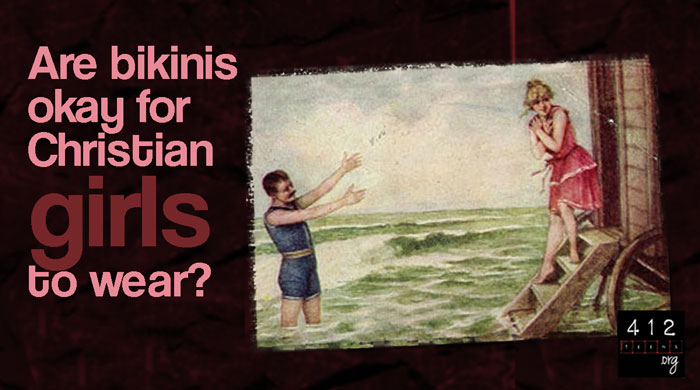Content Menu
● Understanding Modesty in Christianity
>> Biblical Foundations of Modesty
>> Cultural Contexts
● Personal Conviction and Motivation
>> Heart Matters
● The Impact on Others
>> Causing Others to Stumble
● Practical Considerations
>> Setting and Occasion
● Alternative Swimwear Options
● Cultural Evolution of Swimwear
>> Historical Perspectives
>> Empowerment vs. Objectification
● The Role of Media and Fashion
>> Influence on Perceptions
● Navigating Personal Convictions
>> Seeking Guidance
● Conclusion
● Frequently Asked Questions
>> 1. Is it a sin for Christian women to wear bikinis?
>> 2. What does the Bible say about modesty?
>> 3. Can wearing a bikini affect my witness as a Christian?
>> 4. What are some alternatives to bikinis for swimming?
>> 5. How do cultural norms influence views on swimwear?
● Citations:
The question of whether Christian women should wear bikinis is a topic that has sparked considerable debate within the Christian community. This discussion often revolves around themes of modesty, personal conviction, cultural norms, and the interpretation of biblical teachings. In this article, we will explore various perspectives on this issue, considering scriptural references, personal motivations, and the broader implications of clothing choices for Christian women.

Understanding Modesty in Christianity
Biblical Foundations of Modesty
Modesty is a concept deeply rooted in Christian teachings. The Bible encourages believers to dress modestly, which is often interpreted as avoiding clothing that draws excessive attention to oneself. A key scripture often cited in this context is 1 Timothy 2:9-10, which states:
> "I also want the women to dress modestly, with decency and propriety, adorning themselves, not with elaborate hairstyles or gold or pearls or expensive clothes, but with good deeds, appropriate for women who profess to worship God."
This passage suggests that a woman's attire should reflect her commitment to God rather than her desire for worldly attention. However, the interpretation of what constitutes "modest" clothing can vary widely among different cultures and individuals.
Cultural Contexts
Cultural norms play a significant role in shaping perceptions of modesty. For instance, in some countries like Brazil, wearing a bikini at the beach is considered standard attire regardless of one's religious beliefs. In contrast, other cultures may view bikinis as inappropriate for women who wish to uphold modesty standards. This disparity highlights the importance of understanding the cultural context when discussing swimwear choices.
Personal Conviction and Motivation
Heart Matters
At the core of the discussion about bikinis lies the question of personal motivation. Why does a woman choose to wear a bikini? Is it for comfort during swimming activities, or is it to seek validation through appearance? Evaluating one's motivations can provide clarity on whether wearing a bikini aligns with one's faith and values.
For many Christians, the choice of swimwear can be seen as an extension of their relationship with God. If wearing a bikini makes one feel uncomfortable or guilty due to personal convictions about modesty, it may be wise to reconsider that choice. Conversely, if a woman feels confident and comfortable in her swimwear without compromising her values or causing others to stumble in their faith, wearing a bikini may not be inherently wrong.
The Impact on Others
Causing Others to Stumble
A critical aspect of Christian living is the principle of love and consideration for others. Romans 14:13 advises believers not to put obstacles in each other's way. This principle extends to clothing choices; if wearing a bikini could lead others into temptation or discomfort, it may be prudent to choose more modest swimwear.
This consideration is particularly relevant in mixed-gender settings where individuals may struggle with purity and thoughts influenced by what they see. Many Christians believe that dressing modestly serves as a witness to their faith and can positively influence those around them.
Practical Considerations
Setting and Occasion
The context in which one wears a bikini also matters significantly. Wearing a bikini at a private pool party among friends may be viewed differently than wearing one at a public beach crowded with strangers. The appropriateness can shift based on who is present and the nature of the gathering.
Moreover, some suggest that if one feels compelled to wear revealing swimwear due to societal pressure or fashion trends rather than personal comfort or preference, it might be worth reevaluating that decision.
Alternative Swimwear Options
For those who wish to maintain modesty while enjoying swimming activities, there are numerous alternatives available:
- One-piece swimsuits: These provide coverage while still being stylish.
- Tankinis: Offering more coverage than traditional bikinis while still allowing for comfort.
- Swim shorts: These can be paired with various tops for added modesty.
- Cover-ups: Lightweight garments that can be worn over swimwear when not in the water.
These options allow women to enjoy swimming without compromising their values or comfort levels.
Cultural Evolution of Swimwear
Historical Perspectives
The evolution of swimwear reflects broader cultural shifts regarding women's bodies and societal expectations. The bikini itself emerged as a controversial garment in the mid-20th century but has since become synonymous with freedom and self-expression for many women. However, this evolution also raises questions about how such garments align with Christian values regarding modesty.
In many Western cultures today, bikinis are widely accepted as normal beachwear. They represent comfort and freedom during leisure activities but also provoke discussions about objectification and self-worth among women. Critics argue that bikinis often accentuate body features designed to provoke sexual attraction, which contradicts traditional definitions of modesty that emphasize avoiding attire drawing attention to one's body[9].
Empowerment vs. Objectification
The conversation surrounding bikinis often pits empowerment against objectification. Many women advocate for their right to wear what they choose as an expression of individuality and confidence. They argue that modesty should encompass how one carries themselves rather than just what they wear.
Conversely, some argue that allowing young girls to wear bikinis normalizes immodesty at an early age and influences their self-image negatively[9]. This dichotomy illustrates the complexity surrounding swimwear choices within Christian communities.

The Role of Media and Fashion
Influence on Perceptions
Media representations significantly shape societal perceptions of swimwear. The fashion industry promotes various styles of bikinis while showcasing diverse body types and encouraging body positivity through social media platforms like Instagram[9]. These representations can impact women's self-esteem and body image positively or negatively.
While some women find empowerment through wearing bikinis, others may experience anxiety due to societal pressures regarding body image[9]. This psychological aspect underscores the importance of considering how external influences affect individual choices regarding swimwear.
Navigating Personal Convictions
Seeking Guidance
As Christians navigate their clothing choices, seeking guidance from scripture and prayer becomes crucial. Romans 14:23 emphasizes that actions stemming from doubt or guilt fall short of God's standards[4]. Therefore, if wearing a bikini causes discomfort or guilt due to personal convictions about modesty, it may be wise to avoid it altogether.
Conversely, if dressing in a certain way strengthens one's faith and aligns with biblical principles without leading others into temptation, it can be viewed as an appropriate choice[4].
Conclusion
The decision about whether Christian women should wear bikinis ultimately comes down to individual conviction, cultural context, and consideration for others. While some may feel comfortable wearing bikinis without compromising their faith, others may find them inappropriate based on personal beliefs about modesty.
As Christians navigate this issue, it is essential to approach it with grace and understanding—recognizing that each person's journey is unique and influenced by various factors including upbringing, culture, and personal convictions.
Frequently Asked Questions
1. Is it a sin for Christian women to wear bikinis?
- The Bible does not explicitly state that wearing bikinis is sinful; however, it emphasizes modesty and personal conviction.
2. What does the Bible say about modesty?
- Scriptures like 1 Timothy 2:9-10 encourage women to dress modestly and focus on good deeds rather than outward appearance.
3. Can wearing a bikini affect my witness as a Christian?
- Yes, how you dress can impact your witness; it's essential to consider how your clothing choices affect others' perceptions of your faith.
4. What are some alternatives to bikinis for swimming?
- Alternatives include one-piece swimsuits, tankinis, swim shorts, and cover-ups which provide more coverage while remaining stylish.
5. How do cultural norms influence views on swimwear?
- Cultural attitudes towards swimwear vary significantly; what is acceptable in one culture may be viewed as inappropriate in another.
Citations:
[1] https://girldefined.com/bikini-destroying-christian-girls-view-modesty
[2] https://www.gotquestions.org/Christian-bikini.html
[3] https://412teens.org/qna/should-a-Christian-girl-wear-a-bikini.php
[4] https://rixaboutique.com/what-are-the-rules-for-clothes-in-christianity/
[5] https://monteandlou.com/blogs/journal/what-is-modest-swimwear
[6] https://anavaparis.com/blogs/latest-trends-in-modest-swimwear-activewear-and-sportwear/cultural-and-religious-influences-on-modest-swimwear-fashion
[7] https://www.jw.org/en/library/magazines/watchtower-study-september-2016/does-your-style-of-dress-glorify-god/
[8] https://www.reddit.com/r/Christians/comments/uoebph/modesty_and_modern_swimwear/
[9] https://www.abelyfashion.com/are-bikinis-immodest.html
[10] https://www.improvebodyimage.com/blog/should-Christian-woman-wear-bikini

































































